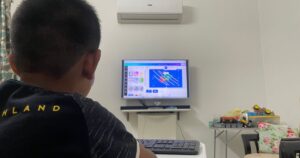I’m Capt. Venkat, and I want to share a bit about my parenting journey with my son, Lakshveer. Here’s how I’ve navigated the ups and downs of raising a child with a focus on encouraging his natural talents and fostering a love for learning:
- Treating Laksh as an Equal: From the beginning, I’ve spoken to Laksh as I would with my friends or co-founders, acknowledging his capabilities and respecting his perspective. Example: When Laksh was just a toddler, I engaged him in conversations about topics that interested me, like technology and innovation, laying the foundation for open communication and mutual respect.
- Encouraging Passions: Observing Laksh closely, I noticed his innate inclination towards certain activities. Instead of imposing my ideas on him, I encouraged his interests and passions, allowing him to explore and grow in his own way. Example: Laksh showed a keen interest in building and tinkering with toys. Instead of pushing him towards traditional learning activities, I provided him with tools and materials to nurture his creativity.
- Limiting Screen Time: Recognizing the drawbacks of excessive screen time, especially for young children, I limited Laksh’s exposure to digital devices, particularly for passive activities like scrolling through videos. Example: While many parents recommended YouTube for learning rhymes and alphabets, I chose to engage Laksh in more interactive and educational activities, like hands-on experiments and DIY projects.
- Addressing Curiosity: I made it a point to address every bit of Laksh’s curiosity, whether by answering his questions directly, demonstrating concepts, or leveraging online resources like YouTube for practical learning experiences. Example: When Laksh expressed curiosity about how household appliances work, we watched YouTube tutorials together to understand their mechanisms and functionalities.
- Hands-On Learning: Understanding Laksh’s strengths and weaknesses, I provided him with opportunities to excel in areas where he thrived, while respecting his limitations and avoiding unnecessary pressure. Example: Laksh demonstrated a natural aptitude for problem-solving and critical thinking. To nurture this, I introduced him to coding games and puzzles that challenged his logical reasoning skills.
- Embracing Creativity: Rather than indulging in mobile or tablet distractions, Laksh’s exposure to technology was carefully curated, starting with an old laptop and gradually transitioning to more interactive devices like a desktop computer and a mini computer fixed to our TV. Example: Laksh’s creativity blossomed when he discovered digital art tools like Canva. By allowing him to experiment with different designs and layouts, he honed his artistic skills and developed a keen eye for aesthetics.
- Observational Learning: One of the most valuable lessons I’ve shared with Laksh is the importance of hands-on learning and observation. By involving him in my day-to-day activities on the computer, I’ve helped him understand the practical applications of technology and creativity. Example: Laksh showed interest in my video editing projects, so I taught him the basics of editing software and encouraged him to create his own short films and animations.
- Embracing Individuality: By steering clear of mainstream influences, Laksh has been able to focus on his own unique interests and talents, free from external pressures or expectations. Example: While many of his peers were obsessed with popular cartoon characters and TV shows, Laksh gravitated towards books and documentaries about science and nature.
- Encouraging Exploration: In dealing with challenges like picky eating habits, I’ve found that patience, communication, and quality time spent together are more effective than relying on gadgets or distractions. Example: Instead of using gadgets as a distraction during mealtime, I’ve prioritized engaging with Laksh through conversation and bonding experiences, ensuring that mealtime remains a positive and enjoyable part of our routine.
- Celebrating Progress: Lastly, I’ve learned to embrace Laksh’s individual journey, recognizing that every child has their own pace and path to follow. By letting Laksh take the lead, I’ve fostered a sense of autonomy and confidence that will serve him well in the years to come. Example: Laksh faced challenges when learning to ride a bike, but instead of comparing him to his peers, I celebrated his progress and encouraged him to continue at his own pace.
Parenting is a journey of discovery and growth, and I’m grateful for the opportunity to support Laksh as he navigates the world around him. By embracing his uniqueness and fostering a love for learning, I’m confident we both will enjoy this journey. If you’re a parent who wants to empower your child’s journey, join our community at PowerParents.





